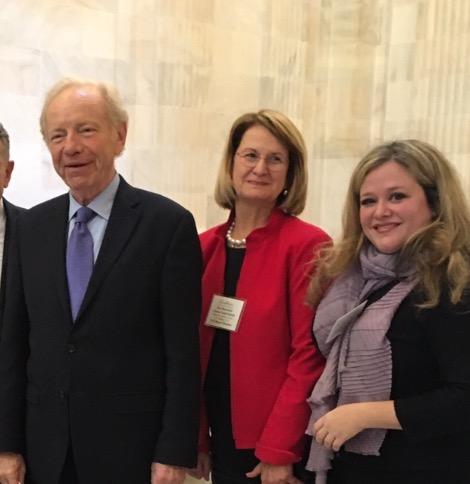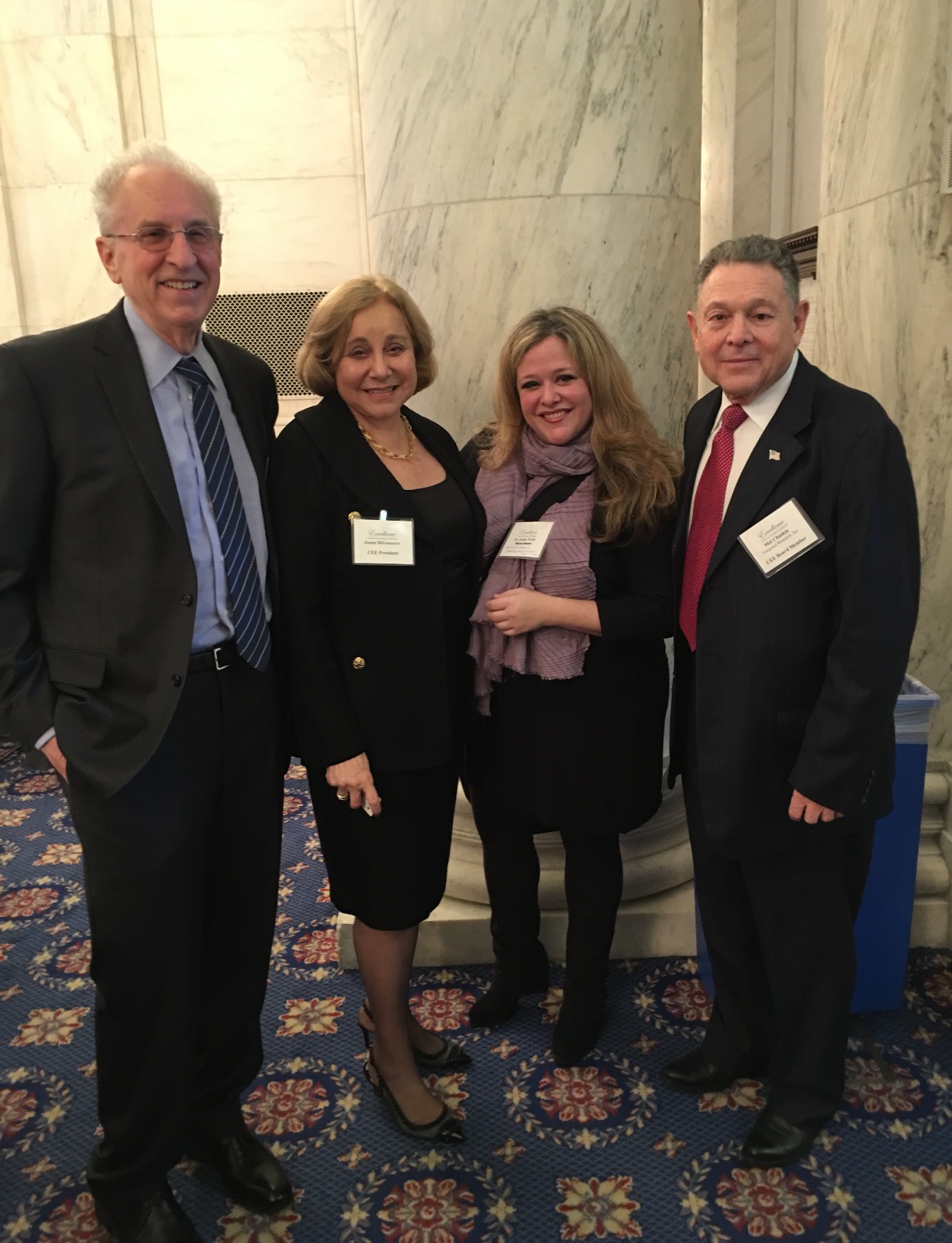
Recently, I had the pleasure of traveling to Washington, D.C. to attend the Congressional Luncheon hosted by the Center for Excellence in Education (CEE) in an effort to support science, technology, engineering and mathematics (STEM) education. The event included the presentation of the Senator Joseph I. Lieberman award for Outstanding Achievement in Science by the Senator himself along with remarks by prominent bipartisan congressional and senatorial figures like Ted Cruz.
CEE’s flagship program is the Research Science Institute (RSI) through which many notable scholars matriculated, for example: Ben Silbermann (co-founder of Pinterest), Feng Zhang (CRISPR) and Terence "Terry" Tao (Field Medalist in Mathematics). Their mission is “to nurture high school and university scholars to careers of excellence and leadership in science, technology, engineering and mathematics, and to encourage international collaboration among leaders in the global community.” Its nationally and internationally recognized programs offer some of “the world’s greatest minds” an opportunity at no cost to cultivate their talent to become tomorrow’s leaders albeit in academia, government, or private institutions.
Founded in 1983 by the late Admiral H.G. Rickover, Father of the Nuclear Navy and civilian uses of nuclear power, and Joann P. DiGennaro, CEE’s President, those who attended RSI are affectionately referred to as “Rickoids” and the afternoon’s emcee “Mrs. D.” I know this because I am an alum of RSI and am a testament to the long-term commitment this organization makes in their students’ futures. Understanding that nurturing children is an essential investment in our national and global futures, CEE’s involvements now extend to include professional development for STEM teachers, BioSTEM Clubs and the USA Biology Olympiad among others.
Now, let’s explore the key themes conveyed throughout the day’s events.
Senator Ted Cruz underscored how pivotal STEM education was to the “hope and opportunity” for both of his parents. He spoke of his mother’s degree in mathematics, her work at the Smithsonian and calculating orbits for Sputnik. His father was a chemical engineer and computer programmer. The Senator conveyed the importance of providing stability and continuity in the fields of science and space exploration, in particular, through a presidential transition. He emphasized the power of STEM education’s bind to the future of our country.
Senator Cruz championed the need for medical cures of rare diseases as well as cancer, heart disease, Alzheimer’s and diabetes specifically. He spoke to the substantial human suffering and financial toll these conditions bring along with his agreement with Bernie Sanders when it comes to “reciprocity drugs” or the consumer’s ability to go outside the U.S. to buy medication. With respect to this issue, he referenced the “right to try” to let medicines from elsewhere help those with the most life-threatening situations. When he talked about FDA reform, he focused on reducing the barriers to innovation and increasing incentives.
To learn more about the challenges of rare diseases and medical cures, please review Did Pompe Disease Get a New Champion in President Trump?, Pompe Disease, Newborn Screening And Inborn Errors Of Metabolism and Did Gene Therapy Cure Sickle Cell Disease?
U.S. House of Representatives: Rob Wittman (R- VA), Jacky Rosen (D-NV), Scott Peters (D-CA), and Bob Goodlatte (R-VA). Each gave brief remarks that ranged from the need to expand STEM learning and innovation by adding such fields as art and design to working toward reducing student debt and continuing efforts to encourage STEM for women and minorities.
Dr. John S. Langford, Keynote Speaker: Dr. Langford, Chairman and CEO of Aurora Flight Sciences Corporation, received his Bachelors degree in Aeronautics, Masters in Aeronautics & Astronautics, Masters in Defense Policy and PhD in Aeronautics and Public Policy from MIT. A member of the NASA Advisory Council, he has repeatedly been awarded honors in recognition of his profound contributions to aeronautics and aviation.
The theme of his talk was about how there are more drone owners than licensed pilots since drones “allow us to see the familiar with new eyes.” He spoke of concepts of completely automated personal transportation devices and how robotic and systems programming (e.g. sensors, software, algorithms) are already in existence to make these efforts not only imaginable, but attainable. In discussing sky robotics, he affirmed what is so extraordinary about the field is that the “robotic revolution is accessible to everyone.” As per Dr. Langford, they are an “ideal tool to open new vistas” and all students can participate.
Senator Joseph Lieberman, a longstanding supporter of CEE, presented his namesake award to Dr. Lauren Ancel Meyers, Professor of Integrative Biology at the University of Texas at Austin. In his introductory words, he recalled the scene from the famous film “The Graduate” where the movie character proclaims “The future is plastics” and substituted the word “algorithms” in recognition of Dr. Meyer’s many contributions to public health via her expertise in mathematical biology. He spoke of the immense pride her mother— who accompanied her to the award ceremony— must have in her innumerable accomplishments and told some humorous anecdotes of his own supportive mother.
Dr. Lauren Ancel Meyers addressed the audience upon acceptance of her award. She spoke of her experience as an RSI alum and proclaims “RSI 1990 was incredibly informative! My cryptography research project, public presentation, and, most of all, my brilliant Rickoid friends, inspired me to become a scientist, tackling real world challenges using advanced mathematics.” Having obtained degrees in math and philosophy from Harvard and her doctorate in Biology from Stanford, she utilizes mathematics to perform tasks like network epidemiology and optimization of infectious disease surveillance. Her efforts in capturing big data for use to combat emerging threats like Zika or Ebola focuses on “building bridges to public health” to “translate and use data to save lives.”
Named by MIT Technology Review one of the top 100 global innovators under age 35 in 2004, Dr. Meyers continues to transform not only through her own research, advising and leadership, but also by training the next generation.
In conclusion, when speaking with Mrs. D about the future of STEM education and careers in the field, her optimism is palpable. She maintains: “Each year I have great hope because the RSI applications are more outstanding every year. People who strive for excellence will continue to strive even in the face of adversity. People who continually strive love to meet challenges and STEM presents a multifactorial opportunity to make a difference.” Appreciating the timeless nature of these disciplines and that the “big scourges have yet to be cured,” she possesses “an overwhelming happiness that I see the alumni making contributions and helping the center to provide help to new students.” Now, that’s progress.


Rickoids including Drs. Meyers & Wells & Mrs D! CEE Trustee Raymond John Yochelson (President, BEST)
Plus, Maite Ballestero (EVP, CEE) Kubacki Mrs. D & Chairman, CEE Board of
Trustees, Mel Chaskin
Note(s):
The Luncheon was sponsored by Google.



